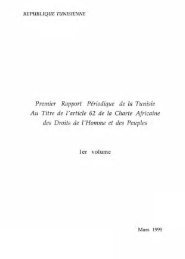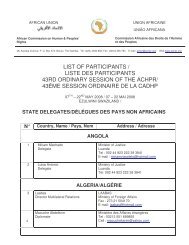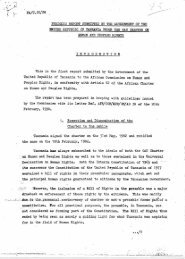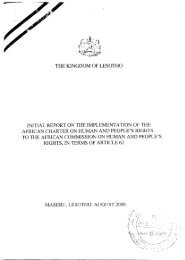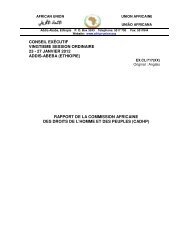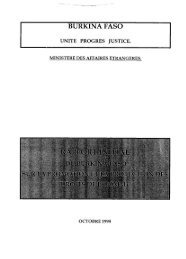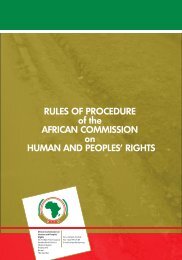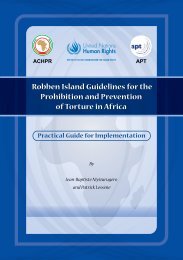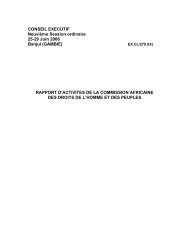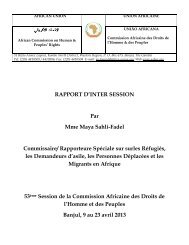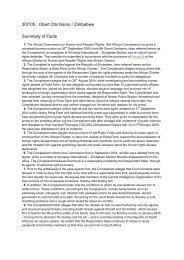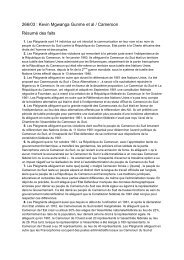By Commissioner Yeung Kam John Yeung Sik Yuen - African ...
By Commissioner Yeung Kam John Yeung Sik Yuen - African ...
By Commissioner Yeung Kam John Yeung Sik Yuen - African ...
Create successful ePaper yourself
Turn your PDF publications into a flip-book with our unique Google optimized e-Paper software.
REPORT<br />
OF<br />
THE CHAIRPERSON OF THE WORKING GROUP ON THE RIGHTS OF OLDER PERSONS<br />
AND PEOPLE WITH DISABILITIES IN AFRICA<br />
<strong>By</strong> <strong>Commissioner</strong> <strong>Yeung</strong> <strong>Kam</strong> <strong>John</strong> <strong>Yeung</strong> <strong>Sik</strong> <strong>Yuen</strong><br />
Presented during the 52 nd Ordinary Session of the <strong>African</strong> Commission on Human and Peoples’ Rights<br />
Yamoussoukro, Cote d’Ivoire, 9 -22 October 2012<br />
1 | P a g e
I. Introduction<br />
1. This Report is presented on the occasion of the 25 th anniversary of the <strong>African</strong><br />
Commission on Human and Peoples’ Rights (the Commission). It is made up of<br />
two parts. Part I outlines the progress made, challenges faced and successes<br />
achieved since the creation of the Working Group on the Rights of Older Persons<br />
and People with Disabilities in Africa (the Working Group). It concludes with<br />
some suggestions for an effective protection of older persons and people with<br />
disabilities in Africa. Part II is on my intersession activity.<br />
Part I<br />
2. The Working Group originated as a Focal Point on the Rights of Older Persons in<br />
Africa which was established by the adoption of Resolution ACHPR/Res.118<br />
(XXXXII) 07 at the 42 nd Ordinary Session held in Brazzaville, Republic of Congo<br />
from 15-28 November 2007.<br />
3. In May 2009, the Commission adopted Resolution ACHPR/Res143 (XXXXV) 09,<br />
which transformed the Focal Point on the Rights of Older Persons in Africa, into a<br />
Working Group on the Rights of Older Persons and People with Disabilities in<br />
Africa during its 45th Ordinary Session held in Banjul, The Gambia. The mandate<br />
of the Working Group is to:<br />
- hold comprehensive brainstorming sessions to articulate the rights of older<br />
persons and people with disabilities;<br />
- draft a Concept Paper for consideration by the <strong>African</strong> Commission that will<br />
serve as a basis for the adoption of the Draft Protocol on Ageing and People<br />
with Disabilities;<br />
- facilitate and expedite comparative research on the various aspects of human<br />
rights of older persons and people with disabilities on the continent,<br />
including their socio-economic rights;<br />
- collect data on older persons and people with disabilities to ensure proper<br />
mainstreaming of their rights in the policies and development programmes<br />
of Member States;<br />
- identify good practices to be replicated in Member States;<br />
II. Successes<br />
2 | P a g e<br />
4. The work undertaken so far by the Working Group focuses on a growing concern<br />
about the situation of older persons in Africa. For example, the <strong>African</strong> Union
Policy Framework and Plan of Action on Ageing requires States Parties to<br />
recognize the rights of older persons, to abolish all forms of discrimination based<br />
on age, and to ensure that the rights of older persons are protected by appropriate<br />
legislation. In addition, paragraph 20 of the Kigali Declaration "calls upon States<br />
Parties to develop a Protocol on the protection of the rights of the elderly and<br />
people with disabilities’<br />
5. It is against this background that the Working Group organised a series of<br />
consultative meetings in 2010 and 2011. These meetings, among other things,<br />
finalized the draft Protocol on the Rights of Older Persons; and also mapped out<br />
the way forward regarding the Draft Protocol on the Rights of People with<br />
Disabilities.<br />
3 | P a g e<br />
6. I am particularly glad to report that the Final Draft Protocol on the Rights of Older<br />
Persons prepared by the Working Group was circulated among the<br />
<strong>Commissioner</strong>s at the 51 st Ordinary Session of the <strong>African</strong> Commission on Human<br />
& Peoples’ Rights held in Banjul in April this year and that much work has been<br />
done towards its adoption. The sections remaining for consideration will<br />
hopefully be completed during the present Private Session so that it can be<br />
adopted and sent to the <strong>African</strong> Union Commission. The first ever Protocol on the<br />
Rights of Older Persons will hopefully be <strong>African</strong>.<br />
7. This Draft Protocol brings to life Article 18(4) of the <strong>African</strong> Charter which<br />
stipulates that "the aged and the disabled shall also have the right to special<br />
measures of protection in keeping with their physical or moral needs.” The Draft<br />
Protocol urges <strong>African</strong> Governments to institute measures aimed at addressing the<br />
needs of older persons such as access to regular incomes; equitable distribution of<br />
resources; employment opportunities; access to appropriate health services; access<br />
to basic social services such as food, water, clothing and shelter; access to good<br />
care and support from the family, the state and private organizations; recognition<br />
of their contribution towards the care of persons with AIDS and orphans; respect<br />
and recognition of the role and contribution that older persons make to society;<br />
and a recognition of their special needs in emergency situations.<br />
8. The Working Group finds that there is a need for an <strong>African</strong> specific Protocol on<br />
the Rights of Persons with Disabilities. Almost 80 per cent of persons with<br />
disabilities live in developing countries. In Africa a growing number of persons<br />
are added to the list of persons with disabilities due to different socio-economic<br />
factors, including the consequences of war, poverty, diseases, ageing, malnutrition,<br />
natural calamities and disasters and accidents.<br />
9. The Accra meeting of experts in 2009 produced the first <strong>African</strong> Draft Protocol on<br />
the Rights of People with Disabilities. The future of such a Protocol is essentially<br />
and solely dependent on the fullest compliance by States Parties with its draft
Article 14 which enjoins all stakeholders to spread awareness by teaching people<br />
through campaigns, media, training, education system and early childhood<br />
development; understand disability rights; fight hurtful practices and the typical<br />
picture of a person with a disability; and uphold persons with disabilities as<br />
productive citizens.<br />
10. In line with the mandate to facilitate and expedite research on the various aspects<br />
of human rights of older persons and people with disabilities on the continent, I<br />
contributed towards the publication of a Chapter entitled “The Rights of Older<br />
Persons and People with Disabilities in Africa” in a Book entitled “The <strong>African</strong><br />
Regional Human Rights System: 30 years after the <strong>African</strong> Charter on Human &<br />
Peoples’ Rights and Beyond”. The book has now been published under the<br />
editorship of Dr Manisuli Ssenyonjo.<br />
11. The Working Group has been a good forum to discuss the issues facing older<br />
people and persons with disabilities in Africa.<br />
III. Challenges<br />
12. While some progress has been made, older people and persons with disabilities<br />
continue to experience challenges of discrimination, poverty and severe difficulties<br />
in accessing fundamental rights. In Africa there is a strong relationship between<br />
disability and poverty. Poverty makes people become more vulnerable to<br />
disability, and disability reinforces and deepens poverty.<br />
13. Gender is at the heart of many violations of the rights of older persons in Africa.<br />
Illiteracy rate is known to be high in many <strong>African</strong> countries, in particular among<br />
women in rural areas. This provides little exposure and access to knowledge of<br />
rulings and standards that have declared discrimination in property inheritance to<br />
be unconstitutional.<br />
14. Furthermore, lack of reliable data about the conditions of older persons and people<br />
with disabilities make it difficult to advocate for proper mainstreaming of their<br />
rights in the policies and development programmes of Member States. Without<br />
information about services, technical aids and health care; it becomes very<br />
challenging for the Working Group to identify good practices in Member States.<br />
15. A survey of state reports to the <strong>African</strong> Commission found that states parties do<br />
not sufficiently deal with the rights of older persons and persons with disabilities.<br />
For example, the state report of the Republic of Cote d’Ivoire submitted for this<br />
Ordinary Session mentions that the effective implementation of legal instruments<br />
4 | P a g e
egarding access of persons with disabilities to employment is pending. 1 The<br />
report is completely silent as to measures put in place towards the implementation<br />
of the rights of older persons.<br />
IV. Conclusion<br />
16. The Working Group would like to use this opportunity to thank all the States<br />
Parties, Intergovernmental Organizations, NGOs and other stakeholders who have<br />
supported its work by participating in the consultations, and making their<br />
comments on the Draft Protocols. This will go a long way towards strengthening<br />
the legal framework for the protection of the rights of older persons and persons<br />
with disabilities in Africa.<br />
17. <strong>African</strong> States are encouraged to develop specific policies and legislation on<br />
securing the rights of older persons and persons with disabilities at a domestic<br />
level.<br />
18. Finally NGOs active in the field of the rights of older persons and persons with<br />
disabilities are encouraged to submit shadow reports to the <strong>African</strong> Commission<br />
and make use of the complaints procedure under the <strong>African</strong> Charter.<br />
Part II: Intersession Activity<br />
5 | P a g e<br />
19. From 15 May to 18 May 2012, I took part in the 2nd Regional East <strong>African</strong> Judicial<br />
Officers Training Workshop on Counter-terrorism, Transnational Crimes and<br />
International Criminal Justice which was held in Bel Ombre, Mauritius. It was<br />
attended by delegates from (1) the International Criminal Court (ICC) in the<br />
person of Justice Sanji Monageng, former Chairperson of our Commission; (2) the<br />
International Criminal Tribunal for Rwanda (ICTR) in the person of its President,<br />
Justice Vagn Prusse Joensen, (3) the Supreme Courts of Burundi, Kenya, Rwanda,<br />
Seychelles, South Sudan, Tanzania and Uganda; (4) the Institute for Security<br />
Services (5) the International Commission of Jurists (ICJ).<br />
20. I delivered the keynote address at the official opening. The address, covered,<br />
among other things, the situation of Terrorism and Transnational Crimes in Africa,<br />
the role of international judicial institutions like the International Criminal Court<br />
(ICC), the international tribunals for the former Yugoslavia (ICTY) and for Rwanda<br />
1 See page 42 of the Report of Cote d’Ivoire
(ICTR) and the International Criminal Tribunals created at the request of States,<br />
namely Sierra Leone, Cambodia, Lebanon, East Timor, etc. The help of Charles B<br />
Nguena and of Irene Mbengue Eleke from the <strong>African</strong> Commission on Human and<br />
Peoples’ Rights (ACHPR) for the background research work is acknowledged with<br />
appreciation.<br />
21. The efforts made by Africa to combat terrorism and transnational crimes with the<br />
adoption since 1999 of the <strong>African</strong> Union Convention on the Prevention and<br />
Combatting of Terrorism was glossed upon as well as the readiness of the ACHPR<br />
in issuing Press Communiqués and passing resolutions to condemn different acts<br />
of terrorism in Africa including recent ones in Nigeria and Mali.<br />
6 | P a g e



